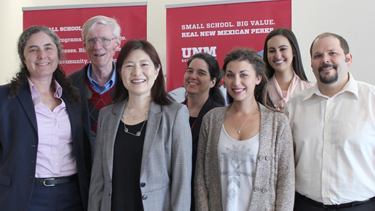U.S. Supreme Court Decision relies on amicus brief by UNM School of Law team
April 4, 2017 - Tamara Williams

University of New Mexico School of Law Professor Jim Ellis (second from left) and a team of faculty and students wrote an amicus brief that was referenced in the U.S. Supreme Court's landmark decision in Moore v. Texas.
The U.S. Supreme Court’s landmark decision last week in Moore v. Texas references an amicus (friend-of-the-court) brief written by University of New Mexico School of Law Distinguished Professor Jim Ellis and a team of UNM Law School faculty and students.
The decision clarified that courts must use current medical diagnostic standards to diagnose intellectual disability for inmates on death row.
The UNM School of Law brief was written on behalf of national disability organizations. It outlines the clinical definition of intellectual disability, describes how Texas has distorted that definition, and how Texas devised a formula of factors that rest heavily on false stereotypes about people with intellectual disability, rather than on clinical standards based in scientific research.
“These so-called ‘Briseño factors’ (named for the case in which the Texas Court created them) use inaccurate and arbitrary standards to diagnose intellectual disability in death penalty cases,” Ellis explains. “All of the Supreme Court justices, including the dissenting justices, agreed with the points made in our brief about the Briseño factors. All eight justices found that the factors are unconstitutional. Texas cannot ignore science in determining intellectual disability.”
Many elements in the Supreme Court decision acknowledge the clinical realities stated in Ellis’ brief. The Court cited the School of Law’s brief twice, and made good use of the information in it. “Evidently, we succeeded in our goal of assisting the Court,” says Ann M. Delpha, Ellis’s co-counsel and the staff attorney at the law school who coordinated the team working on the brief.
“The purpose of an amicus brief is to assist the Court, not the parties,” Ellis elaborates. “That principle is one of the first things we teach with every student team. Our clients—clinical and scientific organizations in the field of intellectual disability—have valuable factual information and scientific knowledge gleaned from decades of research and observation. This is information that we and they thought would be of help to the Court in deciding these difficult issues.”
Latest decision builds on three decades of work
Ellis has been advocating for the disability community in amicus briefs in cases before the U.S. Supreme Court since 1984 and has involved dozens of students and faculty colleagues in each of those cases over the years. He has filed over 20 briefs with the U.S. Supreme Court, Federal Appellate Courts, and the highest courts in several states, each with a team of UNM students and faculty.
“For decades, Professor Ellis has advocated tirelessly for the fair treatment and dignity of people with intellectual disability,” says UNM School of Law Dean Alfred Mathewson. “And for decades, he has included UNM Law School faculty colleagues and student teams in each of those efforts.”
“This is not part of his regular course load,” explains UNM School of Law Dean Sergio Pareja. “Professor Ellis teaches Criminal Law, Constitutional Law, and a variety of other courses. The work he does on the amicus briefs is part of his broader effort to serve the community and the legal profession.”
Professor Carol M. Suzuki has worked on briefs with Ellis for years. “Students participate in a process that demands they adhere to the tenets of confidentiality and professionalism essential to the practice of law,” says Suzuki. “In assisting Professor Ellis on the amicus briefs, students learn the importance of every word, comma, footnote and argument, and how to anticipate the effect of those words and the responses they may bring from other litigants.”
The historic decision in Moore v. Texas is a victory for people with intellectual disabilities and advocates of science and clinical standards. “It is also a human victory, as Bobby James Moore and potentially dozens of people who are constitutionally protected from the death penalty will now be given an opportunity to have their cases evaluated by scientific standards rather than literary fiction,” says Professor April Land, who has worked on many briefs with Ellis. “The victory is especially sweet given that Professor Ellis has been fighting this particular battle for over 30 years.”
Overview of Ellis' advocacy
In the mid-1980s, Distinguished Professor Jim Ellis began to focus on the need for the use of science and clinical standards in the adjudication of people with intellectual disability in the death penalty context. He and a faculty and student team filed an amicus brief Penry v. Lynaugh in 1989.
The work begun in Penry was rewarded in 2002, when Ellis and another team of students and faculty filed briefs in the U.S. Supreme Court case Atkins v. Virginia. Ellis argued the case himself, preparing with the help of moot courts conducted by students and faculty colleagues. It culminated in the Court’s using clinical evidence of the functioning of people with intellectual disability to bar their execution as a violation of the Eighth Amendment.
The work advocating the use of science and clinical standards, not stereotypes, in judging people with intellectual disability continued. In 2014, Ellis and another student and faculty team filed an amicus brief in in Hall v. Florida. The U.S. Supreme Court used that brief in its decision holding that Florida’s refusal to accept the scientifically-necessary standard error of measurement in IQ testing would allow people with an intellectual disability to be executed.
Two years later he and his latest team filed in the current case, Moore.
